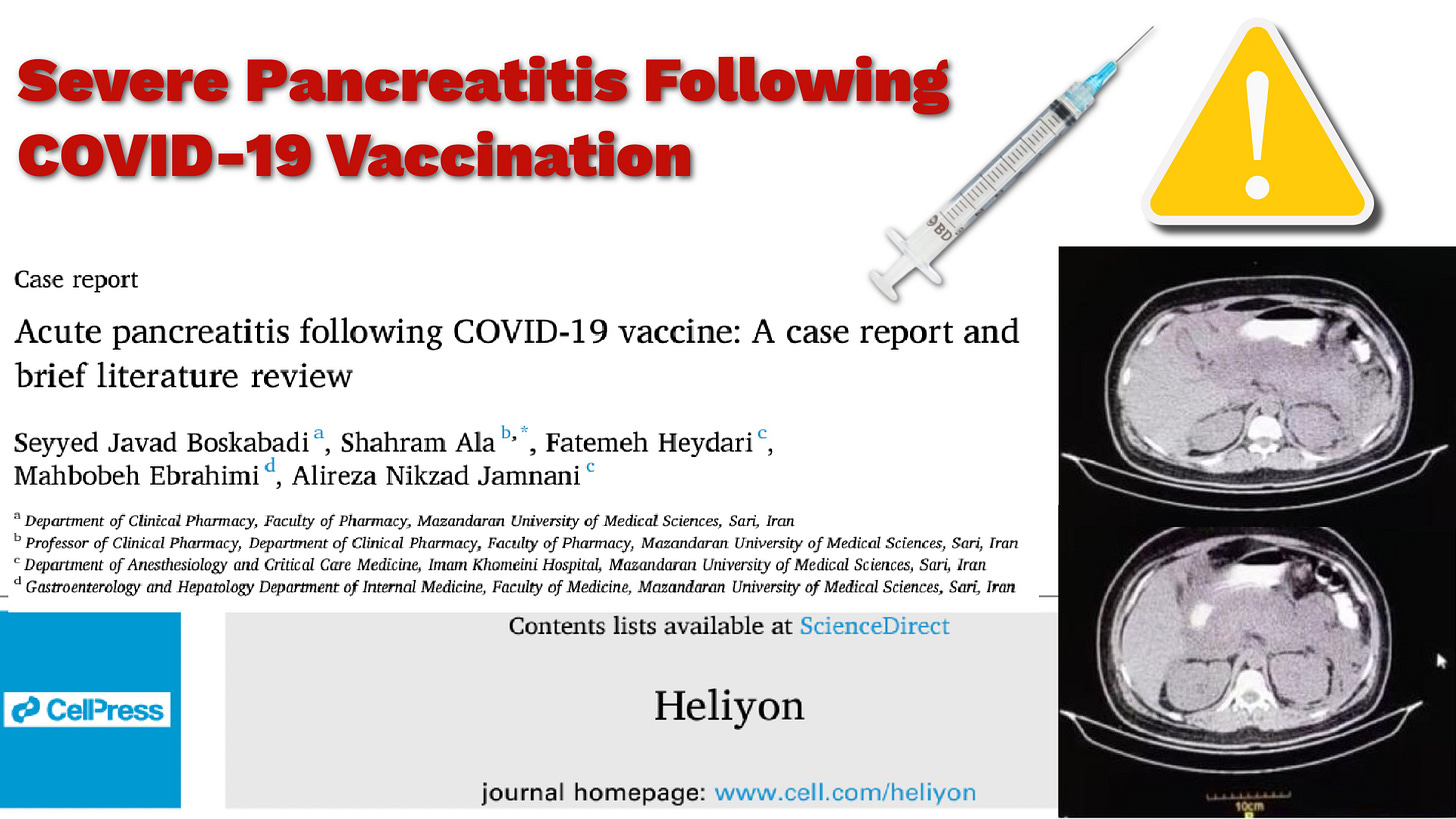First, New Zealand released their largest COVID vaccine safety study to date. Regrettably, the findings were harrowing. A second dose was associated with an enormous rate increase of myocarditis/pericarditis – specifically a 25.8X increased rate. That’s not all. A 70% increased rate of acute kidney injury was observed post second dose.
So you know, the US continues to recommend everyone 6 months or older to get a shot, while countries like Denmark and Sweden will not let males under 30 touch Moderna. There’s something fishy going on.
Next, a newer case study of a young girl who received a COVID vaccine revealed harrowing symptoms, hospitalization, and near death. Essentially, a health 28-year-old-female took a covid shot and shortly after experienced debilitating pancreatitis. Her body pain was so bad she was nearly unable to move. She had to have a needle plunged into her abdomen so excess fluid could be drained. She had to have her blood filtered outside of her body via plasmapheresis. She was coughing up blood. She had to have a tissues sample near her lungs taken. This is not what a healthy 28-year-old should have experienced.
Nonetheless, there’s much more in this publication……
Of course, all data are summarized for you below. However, please read the sources. Finally, please make sure you share this bombshell new data by clicking the button immediately below so the truth gets out!
New Bombshell Study From New Zealand Found Alarming Increase Of Myocarditis And Acute Kidney Injury Within 21 Days Of Taking A 2nd Dose Of Pfizer’s COVID Vaccine
Important points:
-
25.8-times rate increase of myo/pericarditis.
-
70% rate increase of acute kidney injury.
Summary:
A new retrospective cohort study of 4 million New Zealanders aged ≥5+ from Feb 21′-Feb 22′ given 2 doses of Pfizer’s COVID vaccine found a 25.8-times increased rate of myo/pericarditis in those aged 5-19 within 21 days of vax + a 70% increased rate of AKI in all ages 5+.
-Myopericarditis (25.8, 95% CI: 15.6-37.9)
-AKI (1.7, 95% CI: 1.6-1.7)
SOURCE:
https://papers.ssrn.com/sol3/papers.cfm?abstract_id=4329970

Severe Pancreatitis Following COVID-19 Vaccination In A Young, Healthy 28 Year Old Female
Important points:
-
Hospitalized 2X.
-
Admitted to ICU.
-
Required paracentesis (removal of fluid by plunging needle in abdomen)
-
Biopsy of tissue surrounding lung A devastating case-report.
Summary:
3 days after a 2nd COVID vaccine dose, a 28 year old female was admitted to hospital with chief compliant of severe abdominal pain that radiated to left + right flank areas (sides), nausea, hemoptysis (coughing blood), aphagia (couldn’t swallow), + 4 days of no bowel movements. Soon after, patient stabilized then was sent home.
Regrettably, 4 days after discharge she was re-admitted to hospital with severe left leg, and abdominal pain . Ultrasound found fluid surrounding pancreas+abdomen. Labs indicated increased, blood sugar, AST/ALT (liver enzymes indicating damage), and triglycerides (type of lipid in blood).
It is important to note, patient had no predisposing conditions that would have increased the risk of pancreatitis happening like diabetes, hypertriglyceridemia, renal disease, liver disease, etc.
Soon after testing, treatment with IV fluids, antibiotics, insulin, and pains meds were started but patient declined rapidly nonetheless. She experienced respiratory distress with fever, then was transferred to ICU.
At ICU, recurring plasmapheresis was performed (to help lower triglycerides – 1562-norm <200). Unfortunately, after procedure patient developed fever, plural effusion (fluid near lungs), and ascites (abdominal fluid) requiring paracentesis (removal of excess fluid w/needle).
All that indicated infection so antibiotics were started. Interestingly, blood cultures identified NO bacteremia, or fungal infection. Soon after the fever broke, and symptoms resolve antibiotics were stopped. Finally, the patient was discharged under strict observation.



